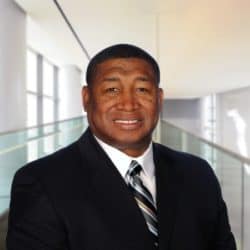
Joining me again for Episode #298 is Billy R. Taylor, for Part 2 of a discussion we started in Episode #293.
Last week, a friend texted me last week and said he couldn't wait for Part 2. He said he pulled off the road to take some notes when he listened to Part 1. So without further ado, here is Part 2.
Here, we discuss “extreme ownership,” why creating ownership is more important than forcing accountability, and important lessons he's learned along the way.
Billy currently the Director of Commercial, Off Highway, and Support Manufacturing North America for The Goodyear Tire & Rubber Company. Over the past 20 years, he has risen from “the lowest level of the organization,” up through the manufacturing leadership ranks at Goodyear, including time as a Plant Director at facilities in Oklahoma and North Carolina.
He's been “engaged in Lean” for over 15 years and he is a Six Sigma Master Black Belt. Billy has a BS in in Electrical Engineering from Prairie View A&M University and an MBA from Baker University.
Streaming Player (Run Time 47:02)

For a link to use for this episode, refer people to www.leanblog.org/298
For earlier episodes of my podcast, visit the main Podcast page, which includes information on how to subscribe via RSS, through Android apps, or via Apple Podcasts. You can also subscribe and listen via Stitcher.
Links, Topics, Questions, and Quotes:
- We continue the discussion about transparency and information sharing, including a mention of the book Team of Teams
- His admin said, “Billy you share too much” information about the business compared to his predecessor
- At the Fayetteville, NC plant, within six months, they took production from 31,000 to 38,000 tires a day, which nobody thought was possible, while working 2% less hours
- One people have the technical things they need to do their job, the leader has earned one of the rights to change. Now comes the cultural right.
- “People didn't know what winning was, so what right did I have to basically ridicule their results?”
- Billy tells a story about ordering 3,000 football jerseys for his team with the number “38” on the front and, where the name normally goes, put “The Choice.”
- “I don't want them to wear the jerseys. I want them to understand what 38 means.” They'll tell me how to get to 38. People wore them all over town. People asked what that meant… that 38 was our customer demand. That was a tool to define winning. Within six months, they were at 38,000 a day.
- When he came back a few years later, people greeted him wearing those jerseys.
- “Billy, what you gave us was ownership.”
- Billy would only let people come visit the plant if they filled out a card he gave them to write down three improvement ideas, or he wouldn't let them out.
- When giving people a challenging goal, ask them what they need to deliver it instead of telling me what cannot do. Tell me what you need. In most cases, you get excuses. If people say, “I need A, B, and C,” then you need to ask them if they can deliver if you get them those things. You transfer ownership. You change the tone of the discussion.
- Sometimes it becomes evident that people don't know what they need.
- We call this cycle where a machine keeps getting better:
- Process prove it
- Process trust it
- Process challenge it
- Process replicate it
- The team assesses what they need to be successful. Ownership was on the floor, not with Billy. He was working for the team, rather than the other way around.
- “You need clarity around what winning is.” That's critical.
- Billy talks about lessons learned from being a star player on the football team in the 8th grade
- His mom set expectations about the grades he needed to maintain
- A week before the city championship game, he got a bad grade… his mom pulled him off the team
- “NFL in this house means ‘No For Long will he be playing.' That was the best thing she ever did for me. She changed the standard for me.”
- It's like a Lean journey… what's the standard??
- “I have a standard of how I treat people.”
- Do you do what you say?
- With his leadership team, “It's not MY meeting, it's THEIR meeting.”
- Question: What was it like to go through the Shingo Prize process in Oklahoma, to win the Silver medallion (and to later get the top prize)?
- We weren't doing it for the award, we did it for the process. “I still use that process today.”
- The first time, they got 774 as a score, when the standard for the top prize was 775.
- “That was a blessing to us.”
- When he visits a plant today, he uses the same process he used when he was a plant manager.
- He does an hour session with the executive team.
- “I no longer want to speak to you for the rest of this visit. I now want to hear from the people. Let's hit the shop floor. It's amazing to see people come to the forefront.”
- “Make people visible, they'll make you valuable.”
- Billy tells the “Golden Broom Award” story about their 5S process and who made the most improvements.
- “How do you build a Lean evangelist instead of a paid prophet?”
- A paid prophet will tell you anything you want to hear to keep making a profit. A Lean evangelist is going to tell the truth about what's working and if it's real or not.”
- Billy talks about their strategy deployment process and teaching that to some high school students.
- Are we aligned? Can you see it?
- Developing people is critical
- “Barking at the red” is a reference to this cartoon that we talked about in Part 1
- We bark at the red because we want to fix it, not to beat others
- Visual management – “we have to make it obvious.”
- Why did you say you don't like the word “accountability?”
- “Accountability's not my focus, ownership is.” If I get you to own the results, accountability is organic. Accountability stays.
- “We believe: Nothing before safety.”
- Can we “hold nurses accountable” for infection rates if the system is understaffed and there were many issues out of their control?
- Book: Extreme Ownership
- On Alabama coach Nick Saban: “He is a disciple for ownership. And people mistake that as a disciple for accountability or a disciple for coming down on people. And he's not. He's a disciple for ownership and process.” He's building mindsets.
- “No one is bigger than the process.”
Please scroll down (or click) to post a comment. Connect with me on LinkedIn.
Let’s build a culture of continuous improvement and psychological safety—together. If you're a leader aiming for lasting change (not just more projects), I help organizations:
- Engage people at all levels in sustainable improvement
- Shift from fear of mistakes to learning from them
- Apply Lean thinking in practical, people-centered ways
Interested in coaching or a keynote talk? Let’s talk.
Join me for a Lean Healthcare Accelerator Trip to Japan! Learn More









